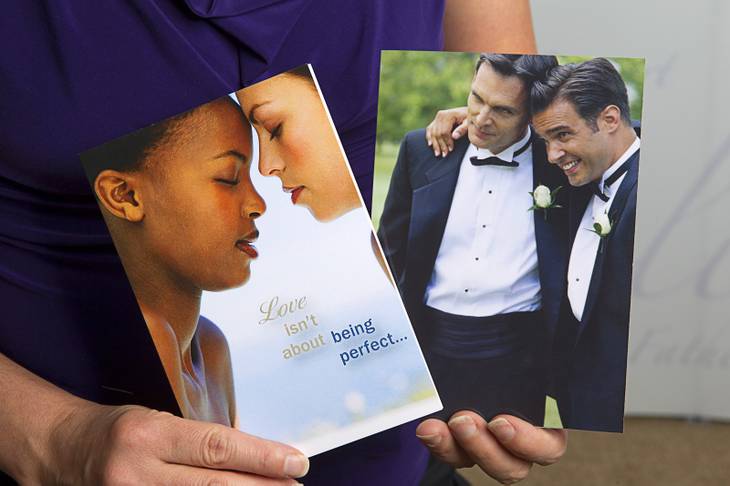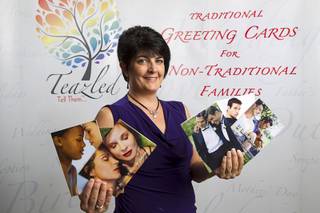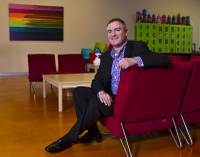The Mother’s Day card had been altered — some words crossed out, others added.
Dina Proto’s teenage daughter wanted to show her mom, and her mom’s then-partner, some appreciation on the holiday, but a greeting card for her situation didn’t exist at the time.
That was in 2005. In 2011, Proto and her wife, Dina “Dom” Poist-Proto (they married in 2006 in California), launched Teazled, an LGBT greeting card company, and now it’s the first to sell its cards in mainstream grocery stores. More than 25 Albertsons nationally sell Teazled cards.
SAME-SEX INDUSTRY
• In September, the 9th U.S. Circuit Court of Appeals will hear a challenge to Nevada’s same-sex marriage ban, voted into law in 2002. Courts across the country over the past year have ruled similar same-sex marriage bans in other states are unconstitutional.
• In a report released in October, the Williams Institute at UCLA noted, based on 2010 census figures, there were more than 7,000 same-sex couples in Nevada. Of those, about 20 percent are raising children under age 18 in their homes.
• In a report released in November, Witeck Communications estimated the buying power of the U.S. adult LGBT population for 2013 would reach $813 billion, up from its estimate of $790 billion for 2012.
“There were gay greeting cards but most were sexually explicit and didn’t speak to core family values, which is unfortunate,” said Proto, 51.
Starting Teazled was just the beginning of Proto’s involvement in the lesbian, gay, bisexual and transgender business community in Las Vegas. Now, she’s also founder and president of the Las Vegas chapter of the National Gay & Lesbian Chamber of Commerce. Proto works to encourage local LGBT-owned businesses to unify and help one another break down social and business equality barriers.
The NGLCC’s local chapter formed this year and will get a chance to boost its profile this week when several members attend the national chamber’s business and leadership conference at Caesars Palace. The conference runs Tuesday through Friday and will offer networking and educational opportunities for more than 700 attendees.
“We also will be reviewing the latest research about the $800 billion spending power behind LGBT consumers,” said Justin Nelson, co-founder and CEO of the national chamber.
“Most importantly, this is a premier networking conference. Business owners go away with new leads that directly help their bottom line.”
Proto encourages local businesses to become certified through the national chamber. To earn certification, a business must be majority-owned and operated by an LGBT person. Once certified, Proto said LGBT-owned businesses can be more recognizable to Fortune 500 companies looking to diversify their supplier base.
“If we don’t tell them we exist, then they are going to think we don’t exist,” Proto said.
The local NGLCC chapter has four certified businesses and several others pursuing the designation. LGBT business certification is in its infancy. Proto said national estimates peg LGBT business ownership around 1.4 million, with about 500 certified.
Eurie Creative of Las Vegas, a graphic design and communications company founded by Victor Rodriguez, is one of the four local NGLCC-certified businesses. Rodriguez has done business with Caesars Entertainment, Cirque du Soleil and the Smith Center for the Performing Arts, but he said exposure to more companies couldn’t hurt.
“It’s up to us to make the best of that introduction. But there’s really no guarantee,” he said.
Ron Henderson, who owns Las Vegas eco-friendly lighting company Varaluz, is completing his certification. He said Varaluz could benefit from being able to network with new large companies. Currently, he sells to major retailers such as Lamps Plus and Ferguson, and others in North America, the Caribbean, Central America and Russia.
“Most large businesses are relationship-based, and you can’t break in without an introduction,” he said.
Las Vegas’ LGBT community has another chamber of commerce, the Lambda Business Association, which has about 250 members and has been around since 1991, said board member and Realtor Rob Schlegel.
The group offers networking luncheons, meetings with guest speakers and other resources.
“I believe being a member of Lambda gives me an advantage in business. ... I reach a broad audience, gay and straight,” Schlegel said.
Schlegel, who also ran the valley’s first gay newspaper, the Las Vegas Bugle, emphasized the importance of LGBT businesses working together and providing opportunities to work with ally businesses, small and large.
“As gay and lesbian people, we could never get anything done without our straight allies,” he said.
Schlegel acknowledged Lambda had some philosophical differences with NGLCC. The chambers work separately today, but he said working together would be beneficial, as the groups mirror each other in many ways. Lambda does not offer certification.
“I do hope someday we would merge or join forces as one organization,” Schlegel said.
Rodriguez, who is a member of both organizations and has lived in other cities where he saw similar divides, also sees some duplication of resources in the local LGBT community — for example with HIV/AIDS support and other services.
“Socially and business-wise, there’s a little more unity needed,” he said.
The rapid pace of legalization of same-sex marriage nationwide in the past year, as well as growing recognition and acceptance of LGBT people, positions business owners and others who market to this demographic for growth.
Tom Kovach, interim director of the Gay & Lesbian Community Center of Southern Nevada, said casino companies in town, for example, marketed aggressively to LGBT consumers.
“It (marketing to the LGBT population) must be done in ways demonstrating that LGBT people are not just a target from a consumer standpoint but are people who are integrated into all aspects of our nation and the broader community,” he said.
Laura Sussman and her partner, Wendy Kraft, have run Kraft-Sussman Funeral Services for more than five years, serving more than 1,200 families.
Sussman, 58, said her drive to open a funeral home came from experiences Kraft as an employee and Sussman as a volunteer saw in the funeral industry.
They often found commissioned employees driven by financial gain rather than service, allowing the emotional needs of a client to go unmet, Sussman said. The couple, mothers of three girls who will likely work in the business, wanted to offer a better experience.
Using public-speaking opportunities, the couple also educate consumers on their rights when dealing with the funeral industry.
“There’s been a lot of press about families going to different mortuaries and not being respected ... and that’s an issue with us,” Sussman said.
But the couple’s sexual orientation takes a back seat to business. They don’t hide it, but their focus is on providing a service.
“I don’t flaunt it. It’s just who I am,” Sussman said.
Rodriguez, owner of Eurie Creative, agreed.
“For me, being a gay businessman is not something I put out on the forefront when I meet with a potential client. ... The design and communication is more important to me,” he said.
Henderson, owner of Varaluz, said he was encouraged to see a growing level of acceptance of LGBT-owned businesses, in general.
“It’s still kind of interesting to get my mind around it being OK to be gay — to be accepted by everyone, even in the business world,” he said.


